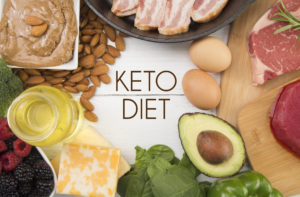 by Dawn Share AP
by Dawn Share AP
Most people by now have heard about the “latest diet craze” called the Keto Diet. Theketogenic diet originated in the 1920s when doctors began using it to control seizures among patients with epilepsy. Basically, the keto diet is a very low carbohydrate, moderate protein and high fat diet that over time changes the way your body burns fuel for energy. When there isn’t a sufficient level of available glucose – the body’s main source of fuel- and glycogen- the stored glucose- blood sugar and insulin are lowered, and the body looks for an alternative source of fuel. The alternate highly efficient fuel source is fat. This process can happen when a person fasts, after prolonged exercise, during starvation, or when eating a low-carb, ketogenic diet. There are many benefits to having your body use fat instead of glucose for energy: better mental clarity, weight loss, and increased energy levels, to name a few. If you have been considering trying the keto diet, here are a few important suggestions to help you be successful.
Digestion:
If you are one of the many people who have been on a low fat, high carb diet, it can be hard to digest fat, so transitioning to a high fat diet may take some time. I recommend to start increasing your daily intake slowly over a few weeks while adding in some digestive support. Taking an oxbile supplement may be helpful and highly recommended, especially if you have had your gallbladder removed. Another simple remedy is to drink the juice of half a fresh
lemon in warm water first thing in the morning. This helps emulsify the fats you are eating by stimulating the liver and gallbladder. Also, a digestive enzyme containing lipase will help to break down dietary lipids. Start by eating eggs in the morning instead of a high fat breakfast. Some people will start with a high fat coffee or tea drink. Using a MCT oil or powder is easier to digest than other types of fat.
Electrolyte imbalance:
Adding in a high quality salt with minerals is so important when it comes to keeping electrolytes in balance. You may feel really bad for a few days when transitioning offcarbohydrates! Don’t get discouraged! Adding in electrolytes will help you avoid feeling bad as your body transitions. Add 2 teaspoons pink salt to your water daily. Food sources of minerals should be targeted as well; 1/2 avocado with lemon juice and salt for potassium, nuts and seeds, leafy greens for magnesium. These are all keto friendly foods. Take around 400 mg magnesium glycinate at bedtime for muscle cramps, better sleep, and for headaches. Drink half your weight in ounces of water.
Nutrient Dense foods:
Many people make the mistake of not eating vegetables on a low carbohydrate diet. Eating at least 3 cups of leafy greens, cruciferous and fermented vegetables daily is vital for nutrients and fiber. Please eat these liberally. Avoid the high density carbohydrate vegetables such as potatoes, winter squashes, many fruits and other root vegetables. The non starchy vegetable foods also help the gut maintain and grow optimal levels of good bacteria. Veggies should always be served with fats and/or acid to facilitate absorption of nutrients. These vegetables are important for optimum hormone, liver and digestive health. Your bowels should be moving every day too!!
Craving sweets:
Try some pure coconut oil in some green tea. The medium chain triglycerides in coconut oil help produce ketones that increase brain function. A square of dark chocolate with salted nut butter or toasted coconut butter on top is satiating and delicious. There are lots of fat bomb recipes on the internet. Having some protein will often curb cravings if you have already met your fat needs for the day. Drinking water when feelings of hunger appear can often shut down that sensation pretty quickly.
Stress:
Pay attention to your digestion, sleep, energy and mood. This can help you make better decisions about your food and lifestyle choices. You have to listen to your body, not just what is written online by the the many keto bloggers. If they are preaching strict macro nutrient rules, then move on and find a more balanced blogger. Give it a good month before assessing if this way of eating is of benefit to you. Be open to the fact that you may do well on this diet for many months and then have a shift and feel the need to go back to adding in more carbohydrates. Some people find they do better eating higher carbohydrate intake a couple days a week. Continually checking in on your body, mind and spirit is key to staying healthy and deriving the optimum health benefits from any diet.
For more information regarding following a keto diet or guidance in finding the best diet for you call Holistic Women and Families Natural Health Center and set up an appointment. We can help you use food as medicine and gain back your health and vitality.

